Unit 10 You're supposed to shake hands. Section A (Grammar Focus~4c)课件(共22张PPT)
文档属性
| 名称 | Unit 10 You're supposed to shake hands. Section A (Grammar Focus~4c)课件(共22张PPT) |
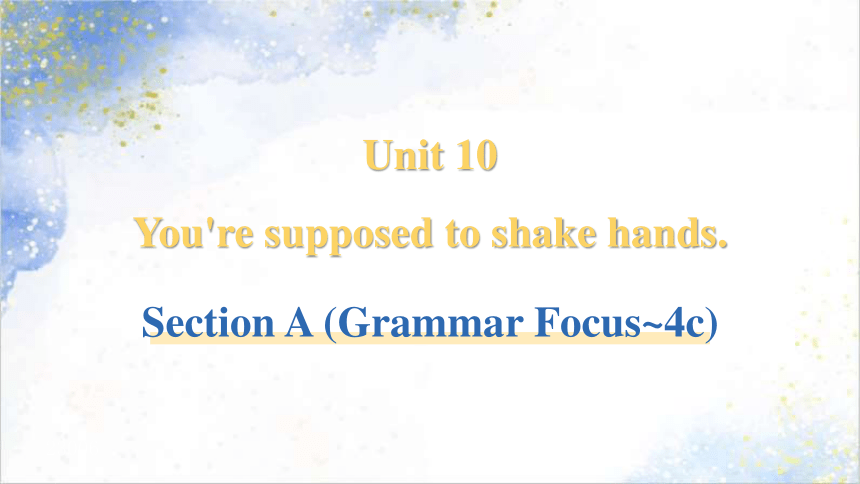
|
|
| 格式 | pptx | ||
| 文件大小 | 8.1MB | ||
| 资源类型 | 教案 | ||
| 版本资源 | 人教新目标(Go for it)版 | ||
| 科目 | 英语 | ||
| 更新时间 | 2024-11-23 00:00:00 | ||
图片预览

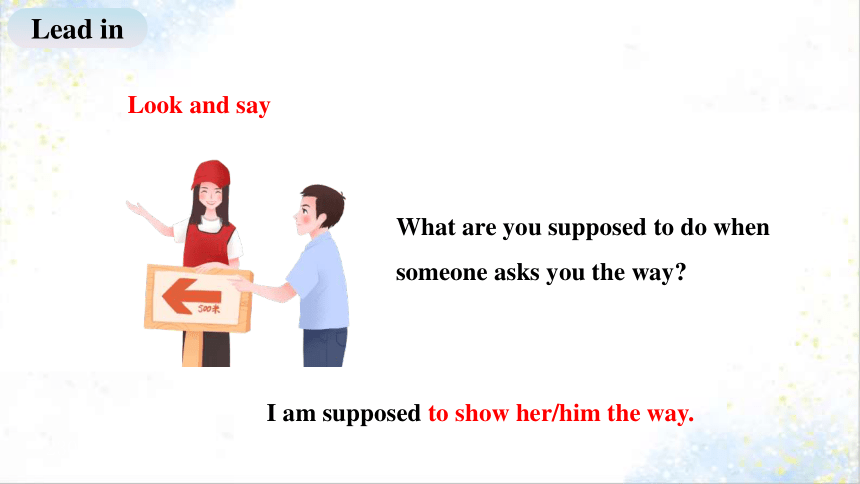
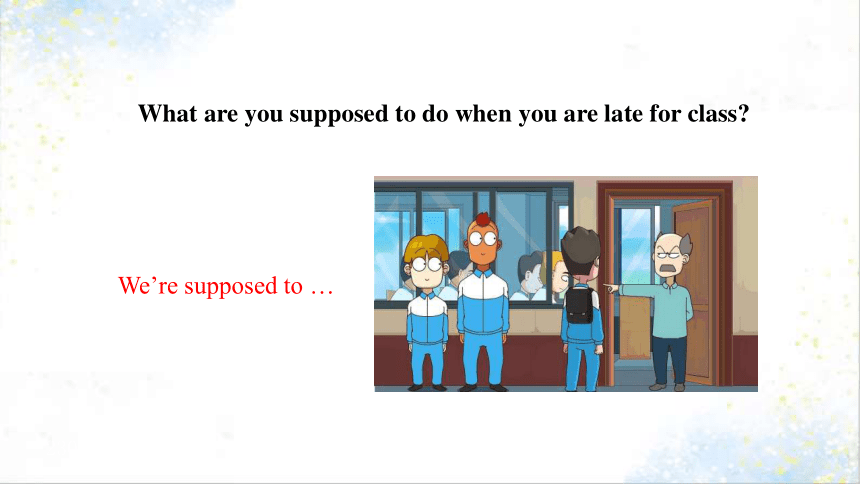
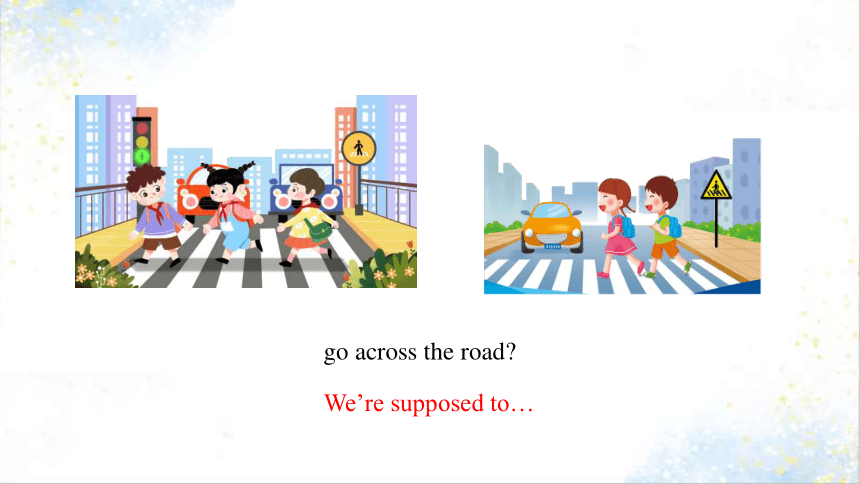

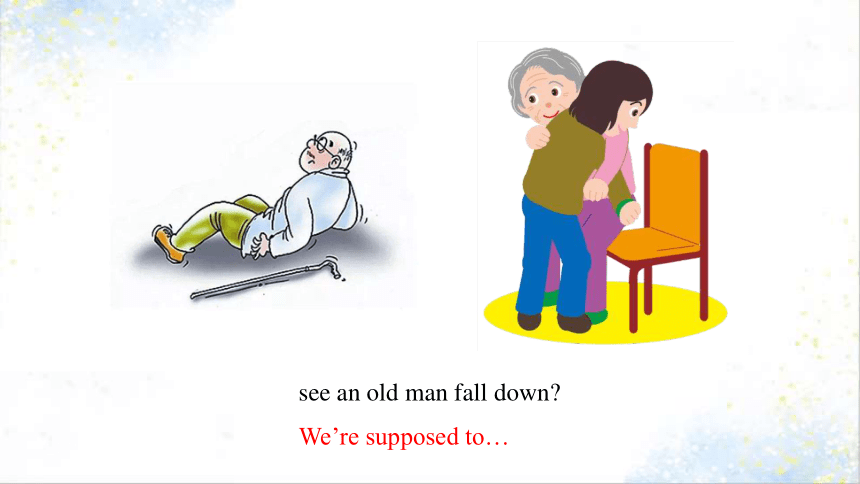
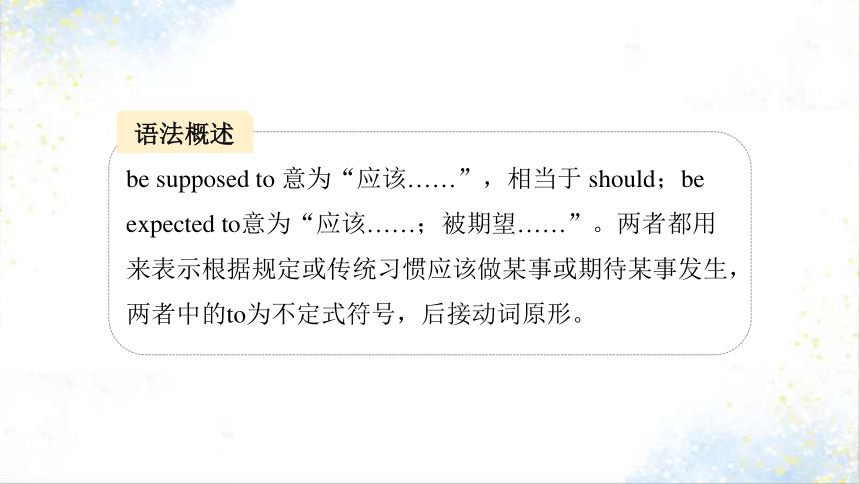
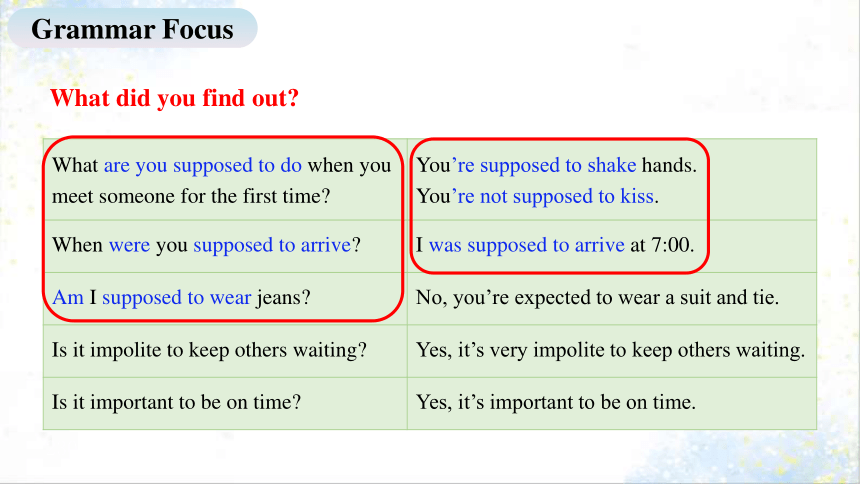
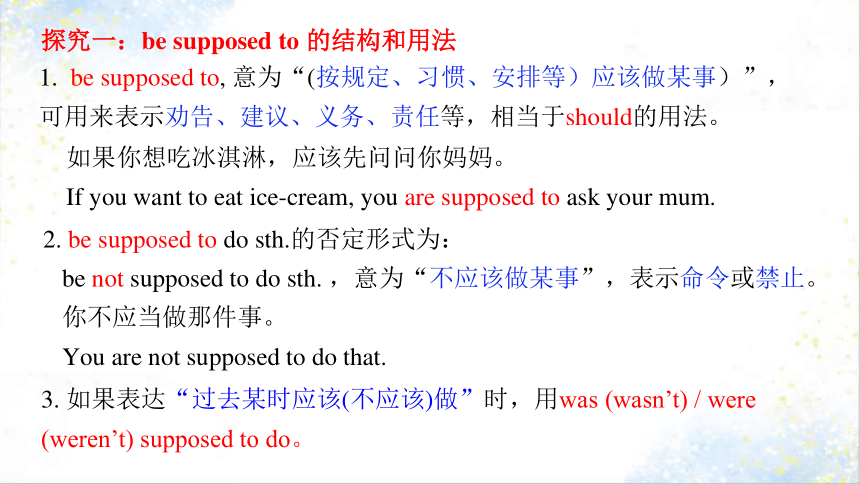
文档简介
(共22张PPT)
Unit 10
You're supposed to shake hands.
Section A (Grammar Focus~4c)
What are you supposed to do when someone asks you the way
I am supposed to show her/him the way.
Look and say
Lead in
What are you supposed to do when you are late for class
We’re supposed to …
We’re supposed to…
go across the road
What are you supposed to do when you…
see rubbish everywhere
We’re supposed to…
We’re supposed to…
see an old man fall down
be supposed to 意为“应该……”,相当于 should;be expected to意为“应该……;被期望……”。两者都用来表示根据规定或传统习惯应该做某事或期待某事发生,两者中的to为不定式符号,后接动词原形。
语法概述
What are you supposed to do when you meet someone for the first time You’re supposed to shake hands.
You’re not supposed to kiss.
When were you supposed to arrive I was supposed to arrive at 7:00.
Am I supposed to wear jeans No, you’re expected to wear a suit and tie.
Is it impolite to keep others waiting Yes, it’s very impolite to keep others waiting.
Is it important to be on time Yes, it’s important to be on time.
What did you find out
Grammar Focus
探究一:be supposed to 的结构和用法
1. be supposed to, 意为“(按规定、习惯、安排等)应该做某事)”,可用来表示劝告、建议、义务、责任等,相当于should的用法。
如果你想吃冰淇淋,应该先问问你妈妈。
If you want to eat ice-cream, you are supposed to ask your mum.
2. be supposed to do sth.的否定形式为:
be not supposed to do sth. ,意为“不应该做某事”,表示命令或禁止。
你不应当做那件事。
You are not supposed to do that.
3. 如果表达“过去某时应该(不应该)做”时,用was (wasn’t) / were (weren’t) supposed to do。
What are you supposed to do when you meet someone for the first time You’re supposed to shake hands.
You’re not supposed to kiss.
When were you supposed to arrive I was supposed to arrive at 7:00.
Am I supposed to wear jeans No, you’re expected to wear a suit and tie.
Is it impolite to keep others waiting Yes, it’s very impolite to keep others waiting.
Is it important to be on time Yes, it’s important to be on time.
What did you find out
探究二:be expected to 的结构和用法
be expected to do sth. 意为“应该做某事”或“被期望做某事”,其表达的主观性比be supposed to do sth. 更强。
希望她晚餐前到达。
She was expected to arrive before dinner.
Grammar Focus
What are you supposed to do when you meet someone for the first time You’re supposed to shake hands.
You’re not supposed to kiss.
When were you supposed to arrive I was supposed to arrive at 7:00.
Am I supposed to wear jeans No, you’re expected to wear a suit and tie.
Is it impolite to keep others waiting Yes, it’s very impolite to keep others waiting.
Is it important to be on time Yes, it’s important to be on time.
What did you find out
Grammar Focus
It’s very impolite to keep others waiting.
It’s normal to cry when we feel sad.
It’s important to be on time.
形式主语
真正主语
不定式做主语时,常用代词it来代替不定式结构。 it为形式主语,而不定式作为真正主语被后置。
探究三:It is + adj. + to do sth. 的结构和用法
It is difficult for him to finish the task within two hours.
It is
adj.
for sb.
to do
for sb.的句型常用于表示事物的特征
探究三:It is + adj. + to do sth. 的结构和用法
Complete the sentences with the phrases in the box.
1. When you go abroad, it ________________ bring your passport.
2. After class, students ________________clean the chalk off the blackboard.
be supposed to, be expected to, be important to
is important to
are supposed to
n. 护照
clean off:把……擦掉
n. 粉笔
n. 黑板
4a
3. If you visit the northern coast of Norway during the winter season, it ______________ pack warm clothes.
4. If there are people in the meeting room, you ______
____________ knock before entering.
5. In many eastern European countries, you ________
_____________ take off your gloves before shaking hands.
is important to
are
are
expected to
supposed to
adj. 北方的;北部的
n. 海岸;海滨
n. 季;季节
v. 敲;击 n. 敲击声;敲击
adj. 东方的;东部的
脱下(衣服);(飞机等)起飞
Fill in the blanks with the correct forms of the words in brackets.
Each country has different rules about social situations. A traveler _____________________ (not expect; know) all of these, but it is helpful _________ (learn) as many of these customs as possible. One of the best ways to be accepted
isn’t expected to know
to learn
4b
in a foreign country is to try _______________ (understand) how people think. Learning what you___________________ (suppose; do) and __________________ (not suppose; do) in social situations may be difficult, but it is worth the trouble if you want to understand another culture.
to understand
are supposed to do
not supposed to do
adj. 值得;有……价值(的)
Make a list of advice for someone coming to your country as an exchange student for the first time. Work with your group to give advice about:
time what to do for someone’s birthday
meeting people visiting someone’s home
table manners giving gifts
n. 方式;方法 (pl.)礼貌;礼仪
4c
time what to do for someone’s birthday
meeting people visiting someone’s home
table manners giving gifts
always on time or little earlier
festival gifts being necessary
call first, and knock at the door
say, “Ni Hao, …” with a smile
giving birthday gifts
older people eating first
I. 根据句意及汉语提示完成句子。
1. Carmen found she had left her __________(护照) at home just before
getting on the plane.
2. The teacher asked me to get some ________(粉笔) for her in the office.
3. We found there was no ___________(黑板) in the classroom on
the first day in school.
4. On this island, there is only one ________(季节),it's spring.
5. You should pay attention to your table _________(礼仪) when you are
living with a foreign family.
passport
chalk
blackboard
season
manners
当堂检测
II. 根据汉语翻译补全句子。
1. 你应该握手。You ____ _________ ___ _______ _______.
2. —你应该什么时候到?—我应该7点钟到。
—When were you _________ ___ _______
—I _____ _________ ___ _______ at 7:00.
3. —让别人一直等待不礼貌吗?
—对, 让别人一直等很不礼貌。
—___ ___ _________ to keep others waiting
—Yes, it’s very impolite to keep others waiting.
4. —准时很重要吗?
—是的, 准时是很重要。
—Is ___ _________ ___ ___ on time
—Yes, it’s important to be on time.
are supposed to shake hands
supposed to arrive
was supposed to arrive
Is it impolite
it important to be
Level A:
1. Recite Grammar Focus.
2. Finish the exercises on the students’ book.
Level B:
1. Read Grammar Focus fluently.
2. Finish the exercises on the students’ book.
Homework
Unit 10
You're supposed to shake hands.
Section A (Grammar Focus~4c)
What are you supposed to do when someone asks you the way
I am supposed to show her/him the way.
Look and say
Lead in
What are you supposed to do when you are late for class
We’re supposed to …
We’re supposed to…
go across the road
What are you supposed to do when you…
see rubbish everywhere
We’re supposed to…
We’re supposed to…
see an old man fall down
be supposed to 意为“应该……”,相当于 should;be expected to意为“应该……;被期望……”。两者都用来表示根据规定或传统习惯应该做某事或期待某事发生,两者中的to为不定式符号,后接动词原形。
语法概述
What are you supposed to do when you meet someone for the first time You’re supposed to shake hands.
You’re not supposed to kiss.
When were you supposed to arrive I was supposed to arrive at 7:00.
Am I supposed to wear jeans No, you’re expected to wear a suit and tie.
Is it impolite to keep others waiting Yes, it’s very impolite to keep others waiting.
Is it important to be on time Yes, it’s important to be on time.
What did you find out
Grammar Focus
探究一:be supposed to 的结构和用法
1. be supposed to, 意为“(按规定、习惯、安排等)应该做某事)”,可用来表示劝告、建议、义务、责任等,相当于should的用法。
如果你想吃冰淇淋,应该先问问你妈妈。
If you want to eat ice-cream, you are supposed to ask your mum.
2. be supposed to do sth.的否定形式为:
be not supposed to do sth. ,意为“不应该做某事”,表示命令或禁止。
你不应当做那件事。
You are not supposed to do that.
3. 如果表达“过去某时应该(不应该)做”时,用was (wasn’t) / were (weren’t) supposed to do。
What are you supposed to do when you meet someone for the first time You’re supposed to shake hands.
You’re not supposed to kiss.
When were you supposed to arrive I was supposed to arrive at 7:00.
Am I supposed to wear jeans No, you’re expected to wear a suit and tie.
Is it impolite to keep others waiting Yes, it’s very impolite to keep others waiting.
Is it important to be on time Yes, it’s important to be on time.
What did you find out
探究二:be expected to 的结构和用法
be expected to do sth. 意为“应该做某事”或“被期望做某事”,其表达的主观性比be supposed to do sth. 更强。
希望她晚餐前到达。
She was expected to arrive before dinner.
Grammar Focus
What are you supposed to do when you meet someone for the first time You’re supposed to shake hands.
You’re not supposed to kiss.
When were you supposed to arrive I was supposed to arrive at 7:00.
Am I supposed to wear jeans No, you’re expected to wear a suit and tie.
Is it impolite to keep others waiting Yes, it’s very impolite to keep others waiting.
Is it important to be on time Yes, it’s important to be on time.
What did you find out
Grammar Focus
It’s very impolite to keep others waiting.
It’s normal to cry when we feel sad.
It’s important to be on time.
形式主语
真正主语
不定式做主语时,常用代词it来代替不定式结构。 it为形式主语,而不定式作为真正主语被后置。
探究三:It is + adj. + to do sth. 的结构和用法
It is difficult for him to finish the task within two hours.
It is
adj.
for sb.
to do
for sb.的句型常用于表示事物的特征
探究三:It is + adj. + to do sth. 的结构和用法
Complete the sentences with the phrases in the box.
1. When you go abroad, it ________________ bring your passport.
2. After class, students ________________clean the chalk off the blackboard.
be supposed to, be expected to, be important to
is important to
are supposed to
n. 护照
clean off:把……擦掉
n. 粉笔
n. 黑板
4a
3. If you visit the northern coast of Norway during the winter season, it ______________ pack warm clothes.
4. If there are people in the meeting room, you ______
____________ knock before entering.
5. In many eastern European countries, you ________
_____________ take off your gloves before shaking hands.
is important to
are
are
expected to
supposed to
adj. 北方的;北部的
n. 海岸;海滨
n. 季;季节
v. 敲;击 n. 敲击声;敲击
adj. 东方的;东部的
脱下(衣服);(飞机等)起飞
Fill in the blanks with the correct forms of the words in brackets.
Each country has different rules about social situations. A traveler _____________________ (not expect; know) all of these, but it is helpful _________ (learn) as many of these customs as possible. One of the best ways to be accepted
isn’t expected to know
to learn
4b
in a foreign country is to try _______________ (understand) how people think. Learning what you___________________ (suppose; do) and __________________ (not suppose; do) in social situations may be difficult, but it is worth the trouble if you want to understand another culture.
to understand
are supposed to do
not supposed to do
adj. 值得;有……价值(的)
Make a list of advice for someone coming to your country as an exchange student for the first time. Work with your group to give advice about:
time what to do for someone’s birthday
meeting people visiting someone’s home
table manners giving gifts
n. 方式;方法 (pl.)礼貌;礼仪
4c
time what to do for someone’s birthday
meeting people visiting someone’s home
table manners giving gifts
always on time or little earlier
festival gifts being necessary
call first, and knock at the door
say, “Ni Hao, …” with a smile
giving birthday gifts
older people eating first
I. 根据句意及汉语提示完成句子。
1. Carmen found she had left her __________(护照) at home just before
getting on the plane.
2. The teacher asked me to get some ________(粉笔) for her in the office.
3. We found there was no ___________(黑板) in the classroom on
the first day in school.
4. On this island, there is only one ________(季节),it's spring.
5. You should pay attention to your table _________(礼仪) when you are
living with a foreign family.
passport
chalk
blackboard
season
manners
当堂检测
II. 根据汉语翻译补全句子。
1. 你应该握手。You ____ _________ ___ _______ _______.
2. —你应该什么时候到?—我应该7点钟到。
—When were you _________ ___ _______
—I _____ _________ ___ _______ at 7:00.
3. —让别人一直等待不礼貌吗?
—对, 让别人一直等很不礼貌。
—___ ___ _________ to keep others waiting
—Yes, it’s very impolite to keep others waiting.
4. —准时很重要吗?
—是的, 准时是很重要。
—Is ___ _________ ___ ___ on time
—Yes, it’s important to be on time.
are supposed to shake hands
supposed to arrive
was supposed to arrive
Is it impolite
it important to be
Level A:
1. Recite Grammar Focus.
2. Finish the exercises on the students’ book.
Level B:
1. Read Grammar Focus fluently.
2. Finish the exercises on the students’ book.
Homework
同课章节目录
- Unit 1 How can we become good learners.
- Section A
- Section B
- Unit 2 I think that mooncakes are delicious!
- Section A
- Section B
- Unit 3 Could you please tell me where the restroom
- Section A
- Section B
- Unit 4 I used to be afraid of the dark.
- Section A
- Section B
- Unit 5 What are the shirts made of?
- Section A
- Section B
- Review of Units 1-5
- Unit 6 When was it invented?
- Section A
- Section B
- Unit 7 Teenagers should be allowed to choose their
- Section A
- Section B
- Unit 8 It must belong to Carla.
- Section A
- Section B
- Unit 9 I like music that I can dance to.
- Section A
- Section B
- Unit 10 You're supposed to shake hands.
- Section A
- Section B
- Review of Units 6-10
- Unit 11 Sad movies make me cry.
- Section A
- Section B
- Unit 12 Life is full of the unexpected
- Section A
- Section B
- Unit 13 We're trying to save the earth!
- Section A
- Section B
- Unit 14 I remember meeting all of you in Grade 7.
- Section A
- Section B
- Review of Units 11-14
